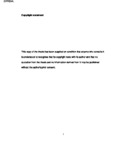Hot Food Takeaways around schools: Can fast food be healthier?
| dc.contributor.supervisor | Pettinger, Clare | |
| dc.contributor.author | Turbutt, Claire Louise | |
| dc.contributor.other | Faculty of Health | en_US |
| dc.date.accessioned | 2020-06-19T13:08:37Z | |
| dc.date.available | 2020-06-19T13:08:37Z | |
| dc.date.issued | 2020 | |
| dc.identifier | 10537785 | en_US |
| dc.identifier.uri | http://hdl.handle.net/10026.1/15772 | |
| dc.description.abstract |
Obesity is the greatest global health challenge facing this generation; over half of the adult population are overweight or obese. Calls for food environment interventions include recommendations for restriction or banning of new fast food retailers (FFRs). The Takeaway Toolkit was published by the Chartered Institute of Environmental Health and aimed to alter consumption of unhealthy takeaway food through reformulation and behavioural insights. A systematic review assessing evidence on FFRs in the environment around schools in the United Kingdom (UK) was completed and published. This revealed a research gap around food environment interventions. A study was designed to investigate “the impact of an intervention based on the Takeaway Toolkit on a fast food retailer”. A pragmatic theoretical framework identified the mixed methods research approach used. A survey with Year 6 pupils identified FFRs they frequented. The most popular sole trading FFR was recruited; customer and nutritional data were collected before and after the application of an intervention. A semi-structured interview was completed with the FFR. Results showed the intervention was successful in reducing calories, fat, salt and sugar content of food sold; the changes had no impact on the sales of food within the premises and therefore indicate an FFR can make changes to the nutritional content of food they sell without undermining their business. Customer experience/preference and profitability were principal influences on whether the FFR made or maintained nutritional improvements. Additionally in the period immediately post-school (3.15pm – 3.45pm) the majority of FFR customers were school pupils. This study identifies the influences on change within FFRs and indicates implementing recommendations within the Takeaway Toolkit may indeed have an impact on the nutritional content of food sold within FFRs. Further research is recommended to confirm these findings, along with extensions to the study investigating customer experience and the impact on wider range of FFRs. | en_US |
| dc.language.iso | en | |
| dc.publisher | University of Plymouth | |
| dc.subject | Fast food | |
| dc.subject | Nutrition | |
| dc.subject | Behaviour change | |
| dc.subject | Obesity | en_US |
| dc.subject.classification | ResM | en_US |
| dc.title | Hot Food Takeaways around schools: Can fast food be healthier? | en_US |
| dc.type | Thesis | |
| plymouth.version | publishable | en_US |
| dc.identifier.doi | http://dx.doi.org/10.24382/1121 | |
| dc.rights.embargoperiod | No embargo | en_US |
| dc.type.qualification | Masters | en_US |
| rioxxterms.version | NA | |
| plymouth.orcid.id | https://orcid.org/0000-0003-3051-1736 | en_US |
Files in this item
This item appears in the following Collection(s)
-
01 Research Theses Main Collection
Research Theses Main


